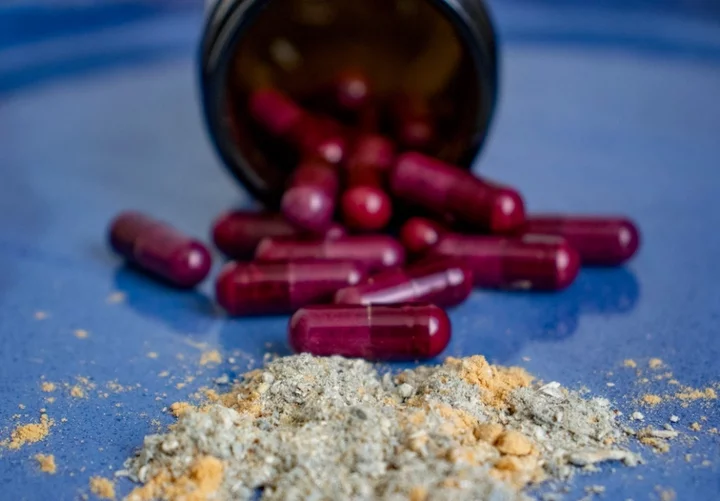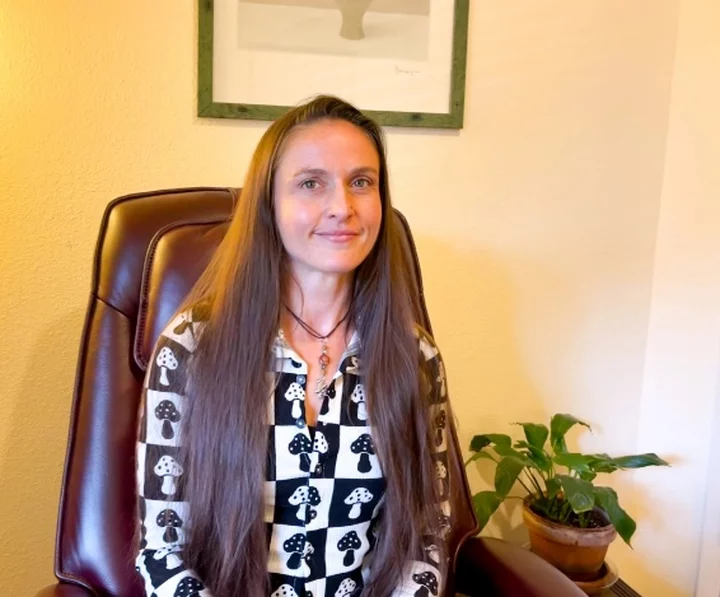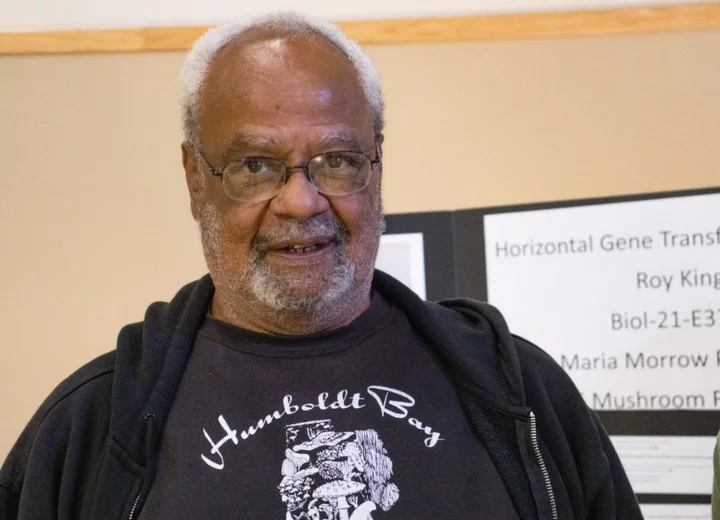A mixture of dried golden teacher psilocybin mushrooms with lion’s mane sits in the forefront of a jar of capsulated powder. Photos: Maranda Vargas.
Ingesting extremely small amounts of psychedelics, commonly called “microdosing,” has become increasingly popular among those seeking improved wellness from psilocybin-containing mushrooms.
Once hyped as a practice to increase creativity and problem solving by engineers in Silicon Valley, microdosing psilocybin mushrooms has gained traction as a possible solution to ease mental health issues. Multiple journal articles report studies on microdosing psilocybin mushrooms that show health benefits such as decreased anxiety, depression and pain.
The practice of microdosing can minimize the psychoactive effects of the mushrooms. By ingesting a small, controlled amount, the user avoids the psychedelic aspects.
Danielle Daniel, owner of Microdosing Humboldt, worked with Decriminalize Nature Humboldt to petition for the decriminalization of entheogens in the city of Arcata. Entheogens are psychoactive substances obtained from fungi, plants or secretions of animals. In October of 2021 the Arcata City Council voted unanimously to decriminalize entheogenic plants and fungi.
Danielle Daniel, owner of Microdosing Humboldt, sits in her office in Arcata.
“Decriminalization is the lowest police priority,” Daniel said. “You cannot sell it; you are not protected if on school grounds or if under 21. You are protected to gift, like what I do. I just charge for my time,” said Daniel.
Daniel, a graduate of the master’s program in sociology, wrote a thesis on psilocybin mushrooms while at Cal Poly Humboldt, conducting 18 interviews.
“I was learning so much about microdosing through the people I was interviewing, I decided to try it out myself,” said Daniel. “After a month of microdosing, I noticed significant reductions in anxiety.”
Molly Swartwout has a history with microdosing psilocybin mushrooms, experimenting with the practice while in college and, presently, with the guidance of a local microdosing coach.
“I have a history of PTSD and anxiety,” said Swartwout. “This is one of the least invasive and lowest side-effect ways. Through the many different things that I’ve tried, it’s also been the most effective.”
Daniel cautions that it is crucial to be consistent and know the strength of the psilocybin mushrooms. There are suggested protocols to adhere to. Psilocybin mushrooms have varying potency, and one must determine their tolerance to not feel any psychoactive effects.
“I suggest start low — less is more,” said Daniel. “If it is a little bit too high, it’s going to increase anxiety and make you unfocused. What a microdose does is it enhances concentration and focus, decreases anxiety and brings you into the present moment.”
Small side effects like headaches or nausea may occur for some individuals. Daniel suggests magnesium to help headaches and eating a light meal before to avoid nausea. Daniel cautions that chocolate and lemon may increase the potency. It is advised that those seeking to microdose do so with the support of their medical care team.
“What it is doing in your brain is it is connecting neurons, creating more neurons and creating plasticity in your brain,” said Daniel. “In the anxious and depressed brain, we don’t have as many neurons connecting and that’s how it is helping to heal your brain.”
A standard dosage protocol for microdosing is three days on with four days off – or, to microdose every other day, Daniel suggests.
“Having the protocol and the specific dosage laid out for me already prepared every time is so helpful,” Swartwout said. “Having someone to help me talk through what is the best way to be intentional about using the medicine, really has made a huge difference.”
The Neuroscience Behind Microdosing
Roy King, a retired associate professor in psychiatry and behavioral sciences at Stanford, lectures at local events about neurobiology, neurosciences and psychedelic psychotherapy.
“I have an interest in the neurosciences of alternative ways of working with people who have treatment-resistant depression and PTSD, or severe anxiety disorders,” said King.
Roy King stands in front of a psilocybin horizontal gene transfer infographic at a public event in Arcata.
King spoke of the importance for randomized and longitudinal scientific studies on the usage of psilocybin mushrooms and entheogens for health.
In 2018, the U.S. Food and Drug Administration designated psilocybin a breakthrough therapy for treating drug-resistant depression and major depressive disorder, which allowed people to conduct scientific research. Research hospitals and institutions like John Hopkins University, University of California Los Angeles and the Department of Veterans Affairs are currently exploring the potential of using psilocybin to treat patients with mental health conditions and alleviate pain.
King suggests integration of positive habits like changing your lifestyle, eating healthy food and meditation during the period after microdosing.
“Here in Humboldt, were blessed with such beautiful nature,” said King. “Going on nature walks are critical for the integration phase to help with the anxiety and depression.”
The scientific research is still pending on the medical effectiveness of microdosing psilocybin containing mushrooms, however those who partake in the trend speak of improved wellness and a growing fondness for the magic mushrooms.
###
Maranda Vargas is a journalism student at Cal Poly Humboldt.



CLICK TO MANAGE